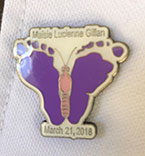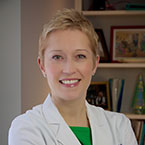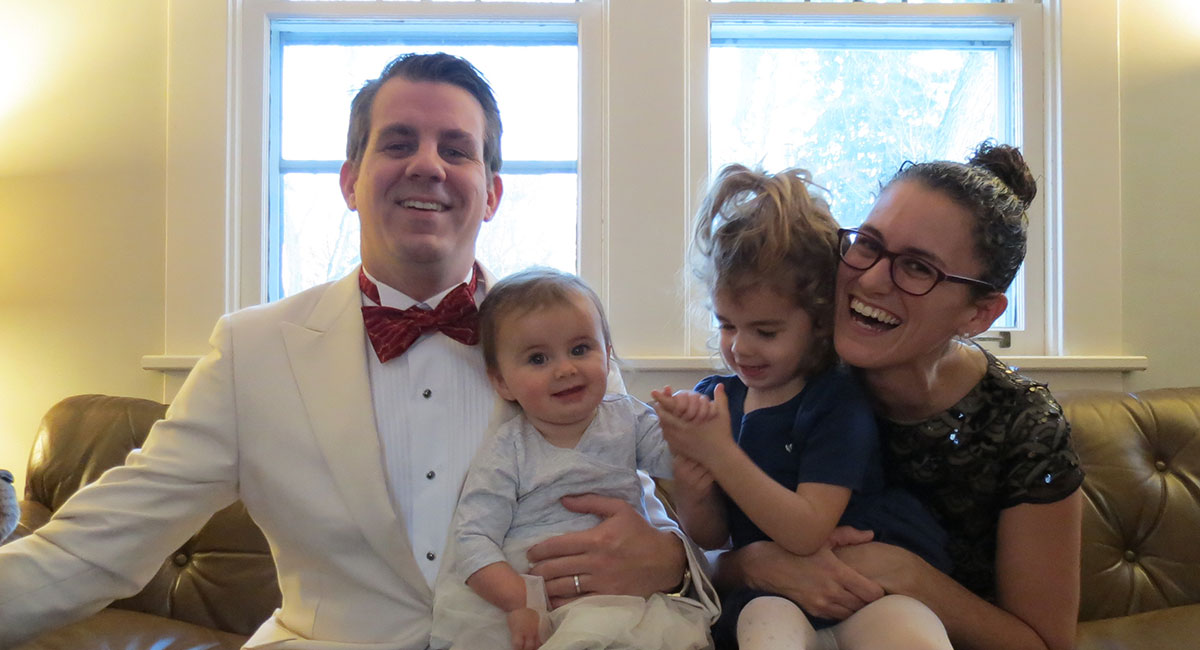By Elizabeth Murray, DO, MBA, FAAP
Kids are curious—and they sure do love putting things in their mouths! Exploring what objects feel and taste like is part of how they learn about the world around them. Children’s non-stop curiosity is what brings all the great (and sometimes silly) questions and creativity, but it can also lead to trouble.
Some days as an emergency medicine doctor, I feel like I’ve seen it all. From a marshmallow stuck in a child’s airway to a child with lead poisoning after swallowing a small toy to keep it away from his little brother. Sometimes, these emergencies hit close to home.
The Gillans’ story below may be hard to read but brings to life how important it is to do all we can to keep our kids safe.
Maisie’s story - how common is it?
We know that about 50,000 U.S. children visit the Emergency Department every year because they swallowed something potentially dangerous. The good news, most of those children go home without having suffered any serious harm. The scary news is that about 9,000 children need to be hospitalized, and some, like Maisie, die from the poisoning.
Medicines are powerful lifesavers, but can also be dangerous—especially to babies, children and teens.
Think "up and away"
The best way to protect kids from unintentional poisoning is to put medicines away safely. Use these tips to keep children from finding medicines in your home:
- Store all medications in a cupboard or high shelf, well out of a child’s sight. In about half of over-the-counter medication poisonings, the child climbed onto a chair, toy or other object to reach the medication.
- Keep medicines in their original containers, with child-safety caps.
- If there are controlled substances (like prescription pain medications or ADHD medicine) consider using a locked box for extra safety.
- Keep track of how many pills are in the bottle and write the start date on the label. This way, if a spill occurs, you’ll know if any are missing.
- When giving your child medicine, lean over a counter or table. This helps contain any accidental spills.
- Any medication can be dangerous, so treat all products with the same respect. We worry about opioids, but some blood pressure and diabetes medications can be fatal to a toddler who swallows only one pill.
- If a medication spills, vacuum or sweep the area as an extra precaution to ensure nothing is missed.
- Dispose of unused medications—especially opioids—at pharmacies, drug "take back" programs or doctors’ offices
- Know basic first aid and keep the Poison Center Number (1-800-222-1222) stored in your phone.
- Get into the practice of safe medication storage, starting as soon as your baby is born.
That terrible morning
 I’ve known the Gillan family for years. On the morning Maisie died, I was the on-call physician for the team that reviews all unexpected deaths of children. The phone calls started to come in. First the investigators, asking if I thought they were missing anything. Her room was perfect, all safe sleep guidelines were followed, the house was completely child-safe.
I’ve known the Gillan family for years. On the morning Maisie died, I was the on-call physician for the team that reviews all unexpected deaths of children. The phone calls started to come in. First the investigators, asking if I thought they were missing anything. Her room was perfect, all safe sleep guidelines were followed, the house was completely child-safe.
Then my mother called, as soon as she heard. Since we knew the family so well, this might have been the hardest of the calls to take. A wonderful, happy, healthy and so very loved little child had been lost, and the family was devastated.
I am honored to have been gifted a "Maisie pin" that I wear on my white coat. It serves as a launch point to talk to families about poisoning prevention so that maybe, no other families have to suffer.
More information
About Dr. Murray
 Elizabeth Murray, DO, MBA, FAAP, is board-certified in pediatrics and pediatric emergency medicine. She is an Assistant Professor in both the Departments of Pediatrics and Emergency Medicine at the University of Rochester. Prior to entering medical school, Dr. Murray completed an MBA at the University of Rochester's Simon School of Business Administration. She is a spokesperson of the American Academy of Pediatrics and can be seen regularly on Good Day Rochester, ABC Affiliate Rochester, NY.
Elizabeth Murray, DO, MBA, FAAP, is board-certified in pediatrics and pediatric emergency medicine. She is an Assistant Professor in both the Departments of Pediatrics and Emergency Medicine at the University of Rochester. Prior to entering medical school, Dr. Murray completed an MBA at the University of Rochester's Simon School of Business Administration. She is a spokesperson of the American Academy of Pediatrics and can be seen regularly on Good Day Rochester, ABC Affiliate Rochester, NY.
About the Gillan Family
 Adam and MaryBeth Gillan reside in Rochester, NY with their three children Rhona (pictured), Maisie (pictured), and Conway (not pictured). Adam works in the consumer packaged goods industry and is an alum of Villanova University (BS) and the University of Rochester (MBA). MaryBeth is an alum of SUNY Brockport and splits time between the home and personal training. Both Adam and MaryBeth continue to parent Maisie as an advocate at all levels for improved poison control standards, safer drug packaging, and child safety laws.
Adam and MaryBeth Gillan reside in Rochester, NY with their three children Rhona (pictured), Maisie (pictured), and Conway (not pictured). Adam works in the consumer packaged goods industry and is an alum of Villanova University (BS) and the University of Rochester (MBA). MaryBeth is an alum of SUNY Brockport and splits time between the home and personal training. Both Adam and MaryBeth continue to parent Maisie as an advocate at all levels for improved poison control standards, safer drug packaging, and child safety laws.